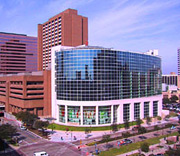Houston, TX (June 22, 2017) – Researchers in Texas Heart Institute’s Cardiomyocyte Renewal Laboratory published study results in the high-impact journal Nature which unveil new insights in the functionality of the Hippo pathway – a genetic pathway related to heart regeneration that was previously discovered by the lab’s researchers. The study revealed a direct correlation between the dystrophin glycoprotein complex (DGC) and the Hippo pathway, which inhibits cardiomyocyte proliferation, thereby restricting the heart’s ability to repair itself after injury.
The team – led by department Director James F. Martin, MD, PhD – learned that DGC binds with the Hippo pathway effector molecule Yap (which typically promotes growth), and it is this molecular interaction that stops the proliferation of cardiomyocytes (heart muscle cells) from occurring. Understanding the underlying molecular interactions that control function of the Hippo pathway is critical to being able to develop safe and effective therapies that enable regeneration and repair of heart muscle tissue.
“The adult mammalian heart’s regenerative capacity is limited due to the reduced ability of cardiomyocytes to progress through mitosis. This regenerative ability exists at birth, but is lost postnatally, leading researchers to believe you could not make cardiomyocytes more proliferative,” said Dr. Martin. “However, our work has shown that is not the case, and that heart tissue renewal is possible which is really exciting.”
DGC is essential in maintaining balance between cardiomyocyte proliferation and apoptosis (cell death). In the absence of DGC, Yap would be able to enter the cell’s nucleus and promote cardiomyocyte production. This means inhibiting the reaction between DGC and Yap would enable cardiomyocytes to be more proliferative thereby leading to heart tissue renewal.
Dr. Martin’s lab will use the findings of this study to develop different ways to manipulate protein interactions within the heart, which they hope will eventually lead to safe treatments for patients suffering from heart failure or even following a heart attack.
In addition to the opportunities for new regenerative heart treatments, this research could also lead to treatments for Muscular Dystrophy (MD), particularly Duchenne Muscular Dystrophy (DMD), an aggressive form of MD which does not have a cure. DMD is caused by an absence of DGC, making Dr. Martin’s findings helpful in better understanding the role DGC plays in cardiac molecular interactions.



